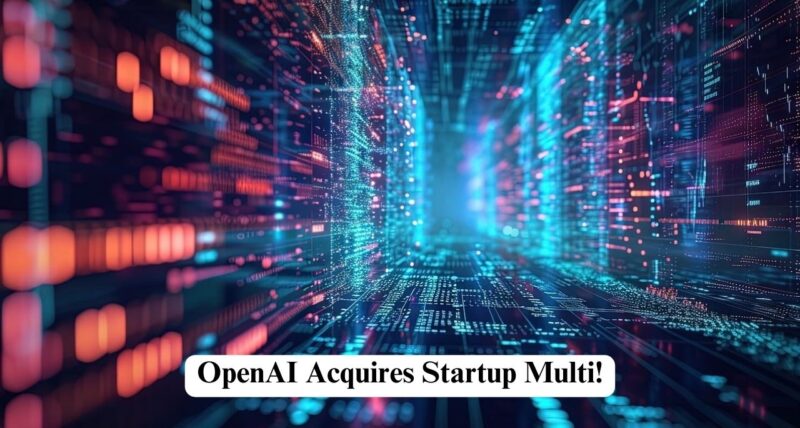In a circulation that surprised many, OpenAI, the famous artificial intelligence studies lab, recently introduced the purchase of Multi. It is a video-first collaboration platform for software development groups. The details of the deal continue to be undisclosed. However, experts predict an acqui-hire, with a select group of Multi members joining OpenAI’s ranks. OpenAI acquires startup Multi, sparking discussions about its future course and potential impact on the way we work.
Multi: A Platform Built For Developers
Founded in 2019 by Alexander Embiricos and Charley Ho, Multi aimed to revolutionize faraway collaboration for developers. Their video-centric platform supplied features that were especially tailor-made to software program development workflows. It consists of real-time code sharing, screen sharing with annotations and AI-powered summaries of video calls. Multi’s attention to AI integration resonated with OpenAI’s expertise. Thus suggesting that these AI capabilities could have been a key component in the purchase.
OpenAI’s Ambitions: Beyond Chatbots
OpenAI acquires startup Multi. It is greatly regarded for its groundbreaking paintings in huge language models, like ChatGPT. However, the purchase of Multi shows a broader imagination and is prescient for the employer. OpenAI might be seeking to leverage its AI prowess. They aim to create a new generation of collaborative equipment that surpasses easy video conferencing.
The Potential Of AI In Collaboration
The possibilities for AI in collaboration are great. Imagine an AI assistant that could automatically transcribe meetings, discover key motion items, and assign them to team members. Or, recall an AI that could examine conversation styles and advocate upgrades to group dynamics. OpenAI acquires startup Multi, and it could be the first step toward knowing these opportunities.
Challenges And Concerns
While the capacity advantages of AI-powered collaboration are clear, there are also challenges to be aware of. Data privacy and protection are paramount concerns. OpenAI will want to make sure that the data accrued through its collaboration tool is handled responsibly and ethically. Additionally, the mixing of AI ought to lead to a feeling of automation and remove human contact from collaboration. Striking stability between AI help and human interaction could be important.
The Future Of Work: A Hybrid Approach
OpenAI acquires startup Multi, thus signifying a shift towards a greater hybrid technique for work. While faraway work has come to be more commonplace, the desire for powerful collaboration remains. AI-powered tools ought to bridge the gap between physical and digital groups, fostering seamless and productive work environments.
OpenAI’s Move: A Catalyst For Change
OpenAI acquires startup Multi to form a major collaboration in the world of technology. It has the potential to redefine the way we work, especially for geographically dispersed teams. The future remains uncertain. However, one aspect is apparent: AI is poised to play a transformative role in the future of collaboration.
OpenAI has yet to officially touch upon its plans for Multi’s generation. They can incorporate it into current products or use it as a foundation for new collaboration tools to ensure visibility. The developer community and the tech industry may be highly interested in this space. OpenAI’s recognition of AI-powered collaboration could potentially lead to a significant shift in our collaborative methods.



